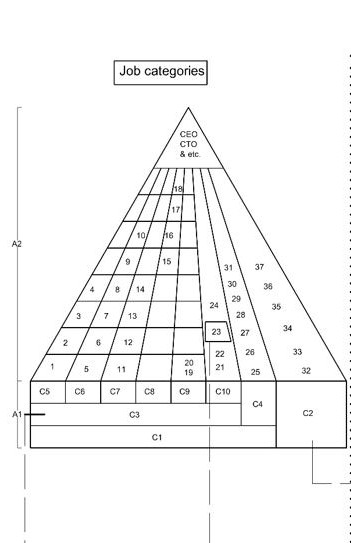Soft Skills and Soft Skills Evaluation Methods, Used in Information Technology and Business Process Management Industry in Sri Lanka
Abstract
The dearth of soft skills and lack of such soft skills measurement tools is the key for many problems in the Information Technology and Business Process Management (IT/BPM) industry in Sri Lanka. Studies on soft skills evaluation methods are skeletal within the industry concerned. In bridging this gap, the researchers investigated into: (a) the soft skills required by different job categories; (b) the currently used methods to measure soft skills, and (c) the challenges and problems associated with the soft skills evaluating process. This study was designed as a qualitative inquiry using constructionist phenomenology. Ten job categories and thirty-six job roles were identified. Forty soft skills and eleven different soft skills evaluation methods were also found out. Eight challenges were identified that affect the soft skills evaluation process. As implications, tendencies to recognise soft skills training, increasing emphasising on soft skills evaluations and perceived risk of hindering the soft skills evaluation process due to the challenges, can be sated. Therefore, it is recommended to strategically approach for soft skills training as a serious HRM agenda. Finally, the model, developed can be used as a framework for IT related competency development, and educating and training IT professionals at institutional levels.
Downloads
References
Al Abduwani, T. (2012). The value and development of soft skills: The case of Oman. International Journal of Information Technology and Business Management, 2(1): 77-86
Ahmed, F., Capretz, L., Bouktif, S. and Campbell, P. (2012). Soft skills requirements in software development jobs: A cross-cultural empirical study. Journal of Systems and Information Technology, 14
Ahmed, F., Capretz, L. F., Bouktif, S., & Campbell, P. (2015). Soft skill and software development: A reflection from the software Industry. International Journal of Information Processing and Management, 14
Armbrüster, T. (2004). Rationality and its symbols: signalling effects and subjectification in management consulting, Journal of Management Studies, 41(8), 1247-1269
Babich, N. (2016). Interview in IT Company: Soft Skills. Retrieved December 20, 2017 from https://medium.com/@101/interview-in-it-company-soft-skills-adaa7502382d
Bishop, T. (2017). The hard truth about soft skills. Muma Business Review, 1(18): 233-239, https://doi.org/10.28945/3803
Collinsdictionary. (2020). Definitions, Thesaurus and Translations. Collins Online Dictionary. Retrieved November 26, 2019 from https://www.collinsdictionary.com/ dictionary/english/soft-skills
Computing Technology Industry Association. (2020). IT Industry Outlook 2019. Retrieved December 20, 2020 from https://www.comptia.org/content/research/it-industry-outlook-2019
Cook, M. (2016). Personnel Selection: Adding Value through People – A Changing Picture (6th ed), Chichester, Wiley/Blackwell.
De Silva, G. (2015). Soft Skills for Sri Lankan ICT Professionals. Proceedings of 8th International Research Conference, KDU. http://ir.kdu.ac.lk/bitstream/handle/345/1140/com-070.pdf?sequence=1&isAllowed=y
Dipboye, R.L., Macan, T. and Shahani-Denning, C. (2012). The selection interview from the interviewer and applicant perspectives: Can’t have one without the other, The Oxford Handbook of Personnel Assessment and Selection (N. Schmitt, Ed.). Oxford: Oxford University Press. DOI: 10.1093/oxfordhb/9780199732579.013.0015
Dorsey, P. (2005). Top 10 Reasons Why Systems Projects Fail. Retrieved November 19, 2019 from http://www.rrsg.ee.uct.ac.za/courses/EEE4084F/Archive/2014/Assignments/Reading%20Assignments/Lect21-Dorsey_Top10ReasonsSystemsProjectsFail.pdf
Ducange, C., Genova, T., Prunotto, F., Dimitrova, K., Dall’Amico, E. and Carrollaggi, P. (2016). The Model of Soft Skill Assessment: The evaluation of soft skills of medium-high skilled migrants (Project Ref. N: 2014-1-IT02-KA204-003515). VHSM Consortium; http://valorize.odl.org/outputs/IO2%20-%20MOSSA%20VHSM.pdf
Esa, A., Dr., Selamat, A., Dr., Padil, S., & Jamaludin, J. (2014). Applications of soft skills in engineering programme at Polytechnic Malaysia. Procedia - Social and Behavioral Sciences 140 (2014), 115 – 120.
Gilman, E. W. (1989). Webster's dictionary of English usage. Merriam-Webster.
Hairi, A. F., Ahmad Toee, B. N., & Razzaly, C. B. (2011). Employers’ perception on soft skills of graduates: A study of Intel Elite soft skill training. International Conference on Teaching & Learning in Higher Education.
Henninger, M., Hörfurter, A. and Mandl, H. (2001). Training soft skills with software (Research report No. 130). Institute for Empirical Pedagogy and Pedagogical Psychology. Ludwig-Maximilians-University; https://epub.ub.uni-muenchen.de/238/1/FB_130.pdf
Jinadasa, L. (2005). IT staff turnover in Sri Lanka a case of large –scale software companies. Department of Computer Science & Engineering, University of Moratuwa, Sri Lanka. http://dl.lib.mrt.ac.lk/bitstream/handle/123/335/86334.pdf?sequence=1
Johns, R., Teo, S. and Harrington, K. (2007). Pick me! Perceptual differences of graduate recruitment and selection methods. Employment Relations Record, 7 (1), 1-10.
Joseph, D., Ang, S., Chang, R. H., & Slaughter, S. A. (2010). Practical intelligence in IT. Communications of the ACM, 53(2),149-154.
Lansakara, L. (2012). An Analysis of skills gaps in Sri Lankan software industry. University of Moratuwa Sri Lanka Dl.lib.mrt.ac.lk. http://dl.lib.mrt.ac.lk/handle/123/200; Accessed 04 Dec. 2017.
Mahasneh, J. K., & Thabet, W. (2016). Developing a Normative Soft Skills Taxonomy for Construction Education. Journal of Civil Engineering and Architecture Research, 3(5), 1468-1486.
Matturro, G. (2013). Soft skills in software engineering: A study of its demand by software companies in Uruguay. 2013 6th International Workshop on Cooperative and Human Aspects of Software Engineering (CHASE), 133-136. doi:10.1109/CHASE.2013.6614749
Mtsweni, E., Hörne, T., & Poll, J. (2016). Soft Skills for Software Project Team Members. International Journal Of Computer Theory And Engineering, 8(2), 150-155.
Muyia, H. M. (2009). Approaches to and Instruments for Measuring Emotional Intelligence: A Review of Selected Literature. Advances in Developing Human Resources, 11(6),690-702.
Muzio, E., Fisher, D. J., Thomas, E. R., & Peters, V. (2007). Soft skills quantification (SSQ) for project manager competencies. Project Management Journal
Osman, W. M.S, Girardi,, A., & Paull, M. (2012). Educator Perceptions of Soft Skill Development: An Examination within the Malaysian Public Higher Education Sector. The International Journal of Learning, 18(10), 49-62
Oxford Learners Dictionaries. (2019). skill noun - Definition, pictures, pronunciation and usage notes | Oxford Advanced American Dictionary. Retrieved December 10, 2019 from https://www.oxfordlearnersdictionaries.com/definition/american_english/skill
Oxford learners Dictionaries. (2021). soft skill noun - Definition, pictures, pronunciation and usage notes | Oxford Advanced American Dictionary. Retrieved February 10, 2021 from https://www.oxfordlearnersdictionaries.com/definition/english/soft-skills?q=soft+skills
Patacsil, F., & S. Tablatin, C. L. (2017). Exploring the importance of soft and hard skills as perceived by IT internship students and industry: A gap analysis. Journal of Technology and Science Education, 7(3), 347-368
Patil, A., Eijkman, H., Bhattacharyya, E. (2012). New media communication skills for engineers and IT professionals: Trans-national and trans-cultural demands. IGI Global, DOI: 10.4018/978-1-4666-0243-4
Rashidi, A., Adabi, A.K., & Ilhamie, A.G. (2013). The Importance of Entrepreneurial Skills in Generic Skills Elements as Perceived by Malaysian Soft Skills Scale (My3S). Jurnal Muamalat Bil, 6, 153-186
Robles, M. M. (2012). Executive Perceptions of the Top 10 Soft Skills Needed in Today’s Workplace. Business Communication Quarterly, 75(4), 453-465.
Sathyendran, N. (2016).. The deal with stress. The Hindu. Retrieved November 29, 2019 from https://www.thehindu.com/features/metroplus/the-deal-withstress/article4880837.ece
Schulz, B. (2008). The importance of soft skills: Education beyond academic knowledge. Journal of Lan-guage & Communication. 2(1), 146-154.
SFIA6 Complete Reference Guide (2015). Skills Framework for the Information Age. SFIA Foundation; Retrieved October 09, 2019 from https://bsmimpact.com/wpcontent/uploads/2016/04/refguide.20150714.en_.5.pdf;.
Sri Lanka Association for Software Services Companies. (2014). Sri Lankan IT/BPM Industry 2014 Review. Retrieved February 10, 2018 from https://slasscom.lk/ sites/default/files/Sri Lankan IT-BPM Industry Review 2014.pdf
Sri Lanka Association for Software Services Companies (2020). Sri Lanka Advantage. Retrieved December 10, 2019 from http://slasscom.lk/srilanka-advantage/
Sommerville, I. (2009). Software engineering (8th ed.). New Delhi: Dorling Kindersley Pvt.Ltd.
Starkweather, J. A., & Stevenson, D. H. (2011). IT hiring criteria vs. Valued IT competencies. Managing IT Human Resources: Advances in Human Resources Management and Organizational Development, 66–81.
Sukhoo, A., Barnard, A., Eloff, M. M., Van der Poll, J. A., & Motah, M. (2005). Accommodating soft skills in software project management. Issues in Informing Science & Information Technology, 2, 692-703
Taylor, E. (2016). Investigating the perception of stakeholders on soft skills development of students: Evidence from South Africa. Interdisciplinary Journal of e-Skills and Life Long Learning, 12, 1-18.
TechRepublic. (2013). Tech companies have highest turnover rate. TechRepublic. Retrieved December 29, 2019 from https://www.techrepublic.com/blog/career-management/tech-companies-have-highest-turnover-rate/
Wilhelm, W. J., Logan, J., Smith, S. M., & Szul, L. F. (2002). Meeting the demand: Teaching "soft" skills. Delta Pi Epsilon; https://files.eric.ed.gov/fulltext/ED477252.pdf

Copyright (c) 2021 INTERNATIONAL JOURNAL OF ECONOMICS, BUSINESS AND HUMAN BEHAVIOUR

This work is licensed under a Creative Commons Attribution-NonCommercial 4.0 International License.











